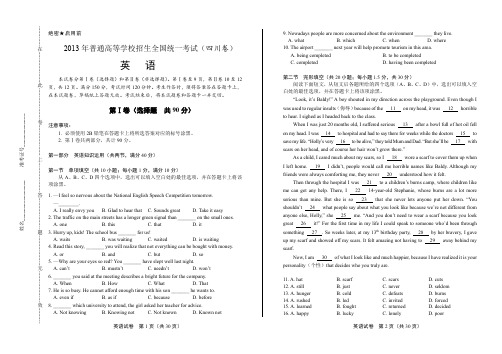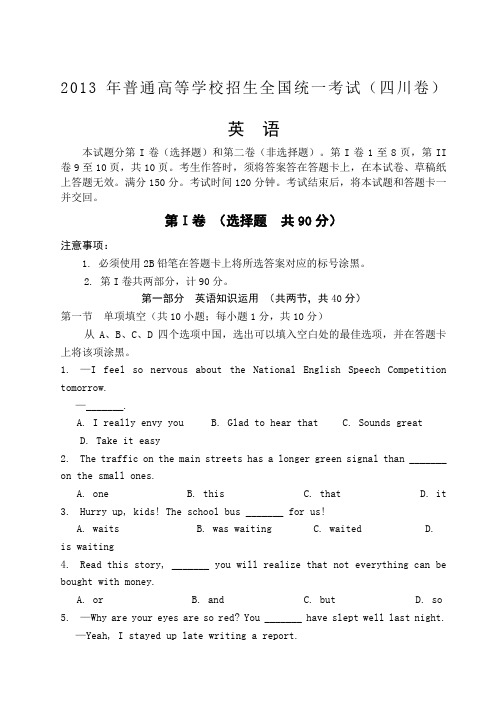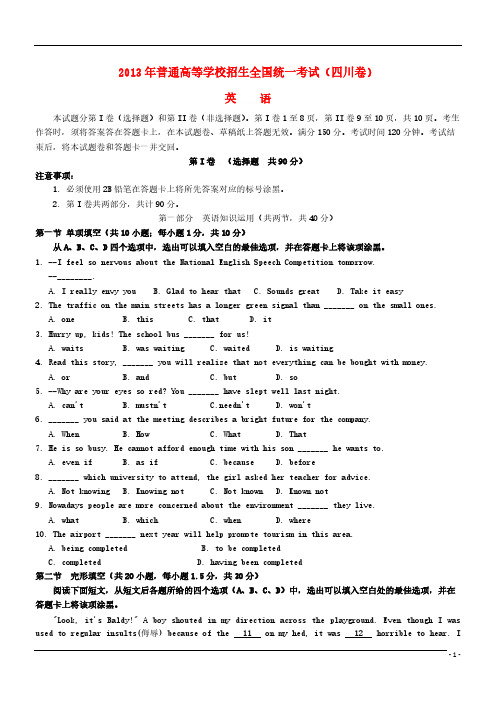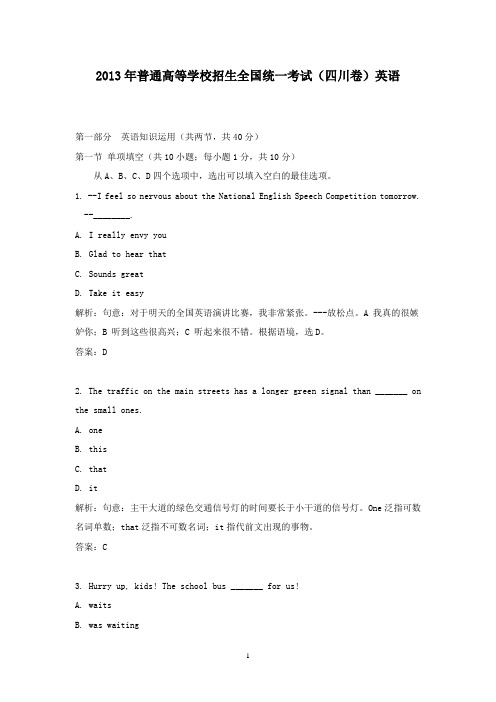2013年四川省高考英语试题附答案
2013年高考英语四川卷(含详细答案)

英语试卷 第1页(共30页) 英语试卷 第2页(共30页)绝密★启用前2013年普通高等学校招生全国统一考试(四川卷)英语本试卷分第Ⅰ卷(选择题)和第Ⅱ卷(非选择题)。
第Ⅰ卷至9页,第Ⅱ卷10至12页,共12页。
满分150分,考试时间120分钟。
考生作答时,须将答案答在答题卡上,在本试题卷、草稿纸上答题无效。
考试结束后,将本试题卷和答题卡一并交回。
第Ⅰ卷(选择题 共90分)注意事项:1. 必须使用2B 铅笔在答题卡上将所选答案对应的标号涂黑。
2. 第Ⅰ卷共两部分,共计90分。
第一部分 英语知识运用(共两节,满分40分)第一节 单项填空(共10小题;每小题1分,满分10分)从A 、B 、C 、D 四个选项中,选出可以填入空白处的最佳选项,并在答题卡上将该项涂黑。
1. —I feel so nervous about the National English Speech Competition tomorrow. —________.A. I really envy youB. Glad to hear thatC. Sounds greatD. Take it easy2. The traffic on the main streets has a longer green signal than _______ on the small ones. A. one B. this C. that D. it3. Hurry up, kids! The school bus _______ for us! A. waits B. was waiting C . waited D. is waiting4. Read this story, _______ you will realize that not everything can be bought with money. A. or B. and C. but D. so5. —Why are your eyes so red? You _______ have slept well last night. A. can’t B. mustn’t C. needn’t D. won’t6. _______ you said at the meeting describes a bright future for the company. A. When B. How C. What D. That7. He is so busy. He cannot afford enough time with his son _______ he wants to. A. even if B. as if C. because D. before8. _______ which university to attend, the girl asked her teacher for advice. A. Not knowing B. Knowing not C. Not known D. Known not9. Nowadays people are more concerned about the environment _______ they live. A. what B. which C. when D. where 10. The airport _______ next year will help promote tourism in this area. A. being completed B. to be completedC. completedD. having been completed第二节 完形填空(共20小题;每小题1.5分,共30分)阅读下面短文,从短文后各题所给的四个选项(A 、B 、C 、D )中,选出可以填入空白处的最佳选项,并在答题卡上将该项涂黑。
2013年高考真题解析——四川卷(英语)纯word版

2013·四川卷第一部分英语知识运用第一节单项填空(共10小题;每小题1分,共10分)从A、B、C、D四个选项中,选出可以填入空白处的最佳选项。
1.—I feel so nervous about the National English Speech Competition tomorrow.—________.A.I really envy you B.Glad to hear thatC.Sounds great D. Take it easy1.D考查情景对话。
上句说担忧,下句应安慰。
I really envy you我真的妒忌你;Glad to hear that听见那么说我很高兴;Sounds great听起来好极了;Take it easy不着急,慢慢来。
句意:——我对明天的全国英语演讲比赛感到很紧张。
——别紧张。
2.The traffic on the main streets has a longer green signal than ________ on the small ones.A. oneB. thisC. thatD. it2.C考查代词的区别。
that代指The traffic,其后有定语限制,常用that,不用one。
句意:主街道上的绿色交通信号灯保持的时间比小街道长。
3.Hurry up,kids! The school bus ________ for us!A. waitsB. was waitingC. waitedD. is waiting3.D考查时态。
此处在催促孩子们,因为车正在等。
句意:孩子们,快点!校车正在等我们!4.Read this story, ________ you will realize that not everything can be bought with money.A. orB. andC. butD. so4.B考查连词在特殊句型中的使用。
高考英语试题及答案四川卷精校版

2013年普通高等学校招生全国统一考试(四川卷)英语本试题分第I卷(选择题)和第二卷(非选择题)。
第I卷1至8页,第II 卷9至10页,共10页。
考生作答时,须将答案答在答题卡上,在本试卷、草稿纸上答题无效。
满分150分。
考试时间120分钟。
考试结束后,将本试题和答题卡一并交回。
第I卷(选择题共90分)注意事项:1. 必须使用2B铅笔在答题卡上将所选答案对应的标号涂黑。
2. 第I卷共两部分,计90分。
第一部分英语知识运用(共两节,共40分)第一节单项填空(共10小题;每小题1分,共10分)从A、B、C、D四个选项中国,选出可以填入空白处的最佳选项,并在答题卡上将该项涂黑。
1. —I feel so nervous about the National English Speech Competition tomorrow.—_______.A. I really envy youB. Glad to hear thatC. Sounds greatD. Take it easy2. The traffic on the main streets has a longer green signal than _______ on the small ones.A. oneB. thisC. thatD. it3. Hurry up, kids! The school bus _______ for us!A. waitsB. was waitingC. waitedD. is waiting4. Read this story, _______ you will realize that not everything can be bought with money.A. orB. andC. butD. so5. —Why are your eyes are so red? You _______ have slept well last night.—Yeah, I stayed up late writing a report.A. can’tB. mustn’tC. needn’tD. won’t6. _______ you said at the meeting describes a bright future for the company.A. WhenB. HowC. WhatD. That7. He is so busy. He cannot afford enough time with his son _______ he wants to.A. even ifB. as ifC. becauseD. before8. _______ which university to attend, the girl asked her teacher for advice.A. Not knowingB. Knowing notC. Not knownD. Known not9. Nowadays people are more concerned about the environment _______ they live.A. whatB. whichC. whenD.where10.The airport _______ next year will help promote tourism in this area.A. being comparedB. to be completedC. completedD. having been completed第二节完形填空(共20小题;每小题1.5分,共30分)阅读下面短文,从短文后各题所给的所给选项(A、B、C、D)中,选出可以填入空白处的最佳选项,并在答题卡上将该项涂黑。
【VIP专享】2013年普通高等学校招生全国统一考试英语试题(四川卷,解析版)

2013年普通高等学校招生全国统一考试(四川卷)英语本试题分第I卷(选择题)和第II卷(非选择题)。
第I卷1至8页,第II卷9至10页,共10页。
考生作答时,须将答案答在答题卡上,在本试题卷、草稿纸上答题无效。
满分150分。
考试时间120分钟。
考试结束后,将本试题卷和答题卡一并交回。
第I卷(选择题共90分)注意事项:1. 必须使用2B铅笔在答题卡上将所先答案对应的标号涂黑。
2. 第I卷共两部分,共计90分。
第一部分英语知识运用(共两节,共40分)第一节单项填空(共10小题;每小题1分,共10分)从A、B、C、D四个选项中,选出可以填入空白的最佳选项,并在答题卡上将该项涂黑。
1. --I feel so nervous about the National English Speech Competition tomorrow.--________.A. I really envy youB. Glad to hear thatC. Sounds greatD. Take it easy2. The traffic on the main streets has a longer green signal than _______ on the small ones.A. oneB. thisC. thatD. it3. Hurry up, kids! The school bus _______ for us!A. waitsB. was waitingC. waitedD. is waiting4. Read this story, _______ you will realize that not everything can be bought with money.A. orB. andC. butD. so5. --Why are your eyes so red? You _______ have slept well last night.A. can'tB. mustn'tC.needn'tD. won't6. _______ you said at the meeting describes a bright future for the company.A. WhenB. HowC. WhatD. That7. He is so busy. He cannot afford enough time with his son _______ he wants to.A. even ifB. as ifC. becauseD. before8. _______ which university to attend, the girl asked her teacher for advice.A. Not knowingB. Knowing notC. Not knownD. Known not9. Nowadays people are more concerned about the environment _______ they live.A. whatB. whichC. whenD. where10. The airport _______ next year will help promote tourism in this area.A. being completedB. to be completedC. completedD. having been completed第二节完形填空(共20小题,每小题1.5分,共30分)阅读下面短文,从短文后各题所给的四个选项(A、B、C、D)中,选出可以填入空白处的最佳选项,并在答题卡上将该项涂黑。
2013年四川高考英语试卷及答案

2013年普通高等学校招生全国统一考试(四川卷)英语第Ⅰ卷(选择题共100分)第一部分英语知识运用(共两节,共40分)第一节单项填空(共10小题;每小题1分,满分10分)从A、B、C、D四个选项中,选出可以填入空白处的最佳选项,并在答题卡上将该项涂黑。
A.---I feel so nervous about the National English Speech Competition tomorrow.--- .A. I really envy youB. Glad to hear thatC. Sounds greatD. Take it easy2. The traffic on the main streets has a longer green signal than on the small ones.A. oneB. thisC. thatD. it3. Hurry up, kids! The school bus for us!A. waitsB. was waitingC. waitedD. is waiting4. Read this story, you will realize that not everything can be bought with money.A. orB. andC. butD. so5. ---Why are your eyes so red? You have slept well last night.---Yeah, I stayed up late writing a report.A. can‟tB. mustn‟tC. needn‟tD. won‟t6. you said at the meeting describes a bright future for the company.A. WhenB. HowC. WhatD. That7. He is so busy. He cannot afford enough time with his son he wants to.A. even ifB. as ifC. becauseD. before8. which university to attend, the girl asked her teacher for advice.A. Not knowingB. Knowing notC. Not knownD. Known not9. Nowadays people are more concerned about the environment they live.A. whatB. whichC. whenD. where10. The airport next year will help promote tourism in this area.A. being completedB. to be completedC. completedD. having been completed第二节,完形填空(共20小题;每小题1.5分,满分30分)阅读下面的短文,从短文后各题所给的四个选项中(A、B、C和D)中,选出可以填入空白处的最佳选项,并在答题卡上将该选项涂黑。
【精校】2013年普通高等学校招生全国统一考试(四川卷)英语

2013年普通高等学校招生全国统一考试(四川卷)英语第一部分英语知识运用(共两节,共40分)第一节单项填空(共10小题;每小题1分,共10分)从A、B、C、D四个选项中,选出可以填入空白的最佳选项。
1. --I feel so nervous about the National English Speech Competition tomorrow. --________.A. I really envy youB. Glad to hear thatC. Sounds greatD. Take it easy解析:句意:对于明天的全国英语演讲比赛,我非常紧张。
---放松点。
A 我真的很嫉妒你;B 听到这些很高兴;C 听起来很不错。
根据语境,选D。
答案:D2. The traffic on the main streets has a longer green signal than _______ on the small ones.A. oneB. thisC. thatD. it解析:句意:主干大道的绿色交通信号灯的时间要长于小干道的信号灯。
One泛指可数名词单数;that泛指不可数名词;it指代前文出现的事物。
答案:C3. Hurry up, kids! The school bus _______ for us!A. waitsB. was waitingC. waitedD. is waiting解析:句意:抓紧时间,孩子们!校车在外面等着呢。
根据hurry up可得知,校车现在正在外面等着,故用现在进行时。
答案:D4. Read this story, _______ you will realize that not everything can be bought with money.A. orB. andC. butD. so解析:句意:读了这个故事,你会明白不是所有的东西都能用金钱买得到的。
【Word解析版】2013年普通高等学校招生全国统一考试英语(四川卷)1

2013年普通高等学校招生全国统一考试【四川卷】第Ⅰ卷(选择题共90分)注意事项:1.必须使用2B铅笔在答题卡上将所选答案对应的标号涂黑.2. 第Ⅰ卷共两部分,共计90分。
第一部分英语知识运用(共两节,共40分)第一节单项选择(共10小题;每小题1分,共10分)从A、B、C、D四个选项中,选出可以填入空白处的最佳选项,并在答题卡上将该项涂黑。
1.—I feel so nervous about the National English Speech Competition tomorrow.—________.A. I really envy you.B. Glad to hear thatC. Sounds greatD. Take it easy1. D。
本题考查情景交际。
按照英语表达礼貌习惯,对方说紧张,就应该对他进行安慰,take it easy的意思是“放松,别紧张”,为正确答案;其它三个选项的意思分别是“我真羡慕你”,“听到你这样我很高兴”,“听着不错”,均与句意不符,排除。
【句意】我对明天的全国英语演讲比赛感觉很紧张。
2. The traffic on the main streets has a longer green signal than ________ on the small ones.A. oneB. thisC. thatD. it2. C。
本题考查代词。
空处指代的是前面的the traffic,这是个抽象不可数名词,而且是特指,故应该用that;one不是特指,排除选项A; this不能用于此种情况,排除选项B;it 是指代前面提到的同一个东西,而此处并不是同一个,而是另外街道上的交通情况,排除选项D。
【句意】主大街上的绿色交通信号灯比次要的小街道上的时间长。
3. Hurry up, kids! The school bus ________ for us!A. waitsB. was waitingC. waitedD. is waiting3. D。
【精校】2013年普通高等学校招生全国统一考试(四川卷)英语-含答案

2013年普通高等学校招生全国统一考试(四川卷)英语本试题分第I卷(选择题)和第II卷(非选择题)。
第I卷1至8页,第II卷9至10页,共10页。
考生作答时,须将答案答在答题卡上,在本试题卷、草稿纸上答题无效。
满分150分。
考试时间120分钟。
考试结束后,将本试题卷和答题卡一并交回。
第I卷(选择题共90分)注意事项:1. 必须使用2B铅笔在答题卡上将所先答案对应的标号涂黑。
2. 第I卷共两部分,共计90分。
第一部分英语知识运用(共两节,共40分)第一节单项填空(共10小题;每小题1分,共10分)从A、B、C、D四个选项中,选出可以填入空白的最佳选项,并在答题卡上将该项涂黑。
1. --I feel so nervous about the National English Speech Competition tomorrow.--________.A. I really envy youB. Glad to hear thatC. Sounds greatD. Take it easy2. The traffic on the main streets has a longer green signal than _______ on the small ones.A. oneB. thisC. thatD. it3. Hurry up, kids! The school bus _______ for us!A. waitsB. was waitingC. waitedD. is waiting4. Read this story, _______ you will realize that not everything can be bought with money.A. orB. andC. butD. so5. --Why are your eyes so red? You _______ have slept well last night.A. can'tB. mustn'tC. needn'tD. won't6. _______ you said at the meeting describes a bright future for the company.A. WhenB. HowC. WhatD. That7. He is so busy. He cannot afford enough time with his son _______ he wants to.A. even ifB. as ifC. becauseD. before8. _______ which university to attend, the girl asked her teacher for advice.A. Not knowingB. Knowing notC. Not knownD. Known not9. Nowadays people are more concerned about the environment _______ they live.A. whatB. whichC. whenD. where10. The airport _______ next year will help promote tourism in this area.A. being completedB. to be completedC. completedD. having been completed第二节完形填空(共20小题,每小题1.5分,共30分)阅读下面短文,从短文后各题所给的四个选项(A、B、C、D)中,选出可以填入空白处的最佳选项,并在答题卡上将该项涂黑。
- 1、下载文档前请自行甄别文档内容的完整性,平台不提供额外的编辑、内容补充、找答案等附加服务。
- 2、"仅部分预览"的文档,不可在线预览部分如存在完整性等问题,可反馈申请退款(可完整预览的文档不适用该条件!)。
- 3、如文档侵犯您的权益,请联系客服反馈,我们会尽快为您处理(人工客服工作时间:9:00-18:30)。
2013年普通高等学校招生全国统一考试英语(四川卷)(考试时间:120分钟;满分:150分)第I卷(选择题共90分)第一部分英语知识运用(共两节,共40分)第一节单项填空(共10小题;每小题1分,共10分)( ) 1. – I feel so nervous about the National English Speech Competition tomorrow.-- _________.A. I really envy youB. Glad to hear thatC. Sounds greatD. Take it easy ( ) 2. The traffic on the main streets has a longer green signal than _________ on the small ones.A. oneB. thisC. thatD. it( ) 3. -- Hurry up, kids! The school bus _________ for us.A. waitsB. was waitingC. waitedD. is waiting( ) 4. Read this story, _________ you will realize that not everything can be bought with money.A. orB. andC. butD. so( ) 5. -- Why are your eyes so red? You _________ have slept well last night.-- Yeah, I stayed up late writing a report.A. can‟tB. mustn‟tC. needn‟tD. won‟t( ) 6. __________ you said at the meeting describes a bright future for the company.A. WhenB. HowC. WhatD. That( ) 7. He is so busy. He cannot afford enough time with his son _________ he wants to.A. even ifB. as ifC. becauseD. before( ) 8. _________ which university to attend, the girl asked her teacher for advice.A. Not knowingB. Knowing notC. Not knownD. Known not( ) 9. Nowadays people are more concerned about the environment _________ they live.A. whatB. whichC. whenD. where( ) 10. The airport ________ next year will help promote tourism in this area.A. being completedB. to be completedC. completedD. having been completed第二节完形填空(共20小题;每小题1.5分,共30分)“Look, it‟s Baldy!” A boy shouted in my direction across the playground. Even though I was used to regular insults(侮辱)because of the 11 on my head, it was 12 horrible to hear. I sighed as I headed back to the class.When I was just 20 months old, I suffered serious 13 after a bowl full of hot oil fell on my head. I was 14 to hospital and had to stay there for weeks while the doctors 15 to save my life. “Holly‟s very 16 to be alive,” they told Mum and Dad. “But she‟ll be 17 wit h scars on her head, and of course her hair won‟t grow there.”As a child, I cared much about my scars, so I 18 wore a scarf to cover them up when I left home. 19 I didn‟t, people would call me horrible names like Baldy. Although my friends were always com forting me, they never 20 understood how it felt.Then through the hospital I was 21 to a children‟s burns camp, where children like me can get any help. There, I 22 14-year-old Stephanie, whose burns are a lot more serious than mine. But she is so 23 that she never lets anyone put her down. “You shouldn‟t 24 what people say about what you look like because we‟re not different from anyone else, Holly,” she 25 me. “And you don‟t need to wear a scarf because you look great 26 it!” For the first time in my life I could speak to someone who‟d been through something 27. So weeks later, at my 13th birthday party, 28 by her bravery, I gave up my scarf and showed off my scars. It felt amazing not having to 29 away behind my scarf.Now, I am 30 of what I look like and much happier, because I have realized it is your personality(个性)that decides who you truly are.( ) 11. A. hat B. scarf C. scars D. cuts( ) 12. A. still B. just C. never D. seldom( ) 13. A. hunger B. cold C. defeats D. burns( ) 14. A. rushed B. led C. invited D. forced( ) 15. A. learned B. fought C. returned D. decided( ) 16. A. happy B. lucky C. lonely D. poor( ) 17. A. pressed B. occupied C. left D. painted( ) 18. A. possibly B. usually C. finally D. nearly( ) 19. A. Although B. Since C. If D. Before( ) 20. A. correctly B. roughly C. easily D. really( ) 21. A. promoted B. introduced C. reported D. carried( ) 22. A. met B. recognized C. remembered D. caught( ) 23. A. honest B. strong C. active D. young( ) 24. A. write down B. agree with C. pass on D. listen to( ) 25. A. promised B. encouraged C. ordered D. calmed( ) 26. A. in B. for C. without D. beyond( ) 27. A. similar B. strange C. hard D. important( ) 28. A. allowed B. required C. guided D. inspired( ) 29. A. hide B. give C. keep D. put( ) 30. A. sick B. aware C. tired D. proud第二部分阅读理解(共两节,共50分)第一节阅读下列短文,从A、B、C、D四个选项中选出最佳答案。
(共20小题,每小题2分,共40分)A. noteB. reportC. scheduleD. poster( ) 32. What is going to take place on February, 2013?A. A big event to welcome Chinese new year.B. A social gathering to raise money for wildlife.C. A party for close friends to meet and have fun.D. A meeting of Kwun Tong High School students.( ) 33. How much do you have to pay in total if four of you go together?A. $20B. $40C. $60D. $80( ) 34. Which of the following statements is true?A. Tickets are sold in Kwun Tong High School.B. It‟s unnecessary to take soft drinks with you.C. Free digital cameras are provided for everybody.D. Festival food will be served without extra charge.BOn a sunny day last August, Tim heard some shouting. Looking out to the sea carefully, he saw a couple of kids in a rowboat were being pulled out to sea.Tow 12-year-old boys, Christian and Jack, rowed out a boat to s earch for a football. Once they‟d rowed beyond the calm waters, a beach umbrella tied to the boat caught the wind and pulled the boat into open water. The pair panicked and tried to row back to shore. But they were no match for it and the boat was out of control.Tim knew it would soon be swallowed by the waves.“Everything went quiet in my head,” Tim recalls(回忆). “I was trying to figure out how to swim to the boys in s straight line.”Tim took off his clothes and jumped into the water. Every 500 yards or so, he raised his head to judge his progress. “At one point, I considered turning back,” he says. “I wondered if I was putting my life at risk.” After 30 minutes of struggling, he was close enough to yell to the boys, “Take down the umbrella!”Christian made much effort to take down the umbrella. Then Tim was able to catch up and climb aboard the boat. He took over rowing, but the waves were almost too strong for him.“Let‟s aim for the pier(码头),” Jack said. Tim turned the boat toward it. Soon afterwards, waves crashed over the boat, and it began to sink. “Can you guys swim?” he cried. “A little bit,” the boys said.Once they were in the water, Tim decided it would be safer and faster for him to pull the boys toward the pier. Christian and Jack were wearing life jackets and floated on their backs. Tim swam toward land as water washed over the boys‟ faces.“Are we almost there?” they asked again and again. “Yes”, Tim told them each time.After 30 minutes, they reached the pier.( ) 35. Why did the two boys go to the sea?A. To go boat rowing.B. To get back their football.C. To swim in the open water.D. To test the umbrella as a sail.( ) 36. What does “it” in the Paragraph 2 refer to?A. The beach.B. The water.C. The boat.D. The wind.( ) 37. Why did Tim raise his head regularly?A. To take in enough fresh air.B. To consider turning back or not.C. To check his distance from the boys.D. To ask the boys to take down the umbrella.( ) 38. How did the two boys finally reach the pier.A. They were dragged to the pier by Tim.B. They swam to the pier all by themselves.C. They were washed to the pier by the waves.D. They were carried to the pier by Tim on his back.CLONDON – A British judge on Thursday sentenced a businessman who sold fake(假冒的)bomb detectors (探测器)to 10 years in prison, saying the man hadn‟t cared about potentially deadly co nsequences.It is believed that James McCormick got about $77.8 million from the sales of his detectors – which were based on a kind of golf ball finder – to countries including Iraq, Belgium and Saudi Arabia.McCormick, 57, was convicted(判罪)of cheats last month and sentenced Thursday at the Old Bailey court in London.“Your cheating conduct in selling a great amount of useless equipment simply for huge profit promoted a false sense of security and in all probability materially contributed to causing death and injury to innocent people,” Judge Richard Hone told McCormick. “You have neither regret, nor shame, or any sense of guilt.”The detectors, sold for up to $42,000 each, were said to be able to find such dangerous objects as bombs under water and from the air. But in fact they “lack any grounding in science” and were of no use.McCormick had told the court that he sold his detectors to the police in Kenya, the prison service in Hong Kong, the army in Egypt and the border control in Thailand.“I never had any bad result from customers,” he said.( ) 39. Why was McCormick sentenced to prison?A. He sold bombs.B. He caused death of people.C. He made detectors.D. He cheated in business.( ) 40. According to the Judge, what McCormick had done ________.A. increased the cost of safeguardingB. lowered people‟s guard against dangerC. c hanged people‟s idea of social securityD. caused innocent people to commit crimes ( ) 41. Which of the following is true of the detectors?A. They have not been sold to Africa.B. They have caused many security problems.C. They can find dangerous objects in water.D. They don‟t function on the basis of science.( ) 42. It can be inferred from the passage that McCormick ________.A. sold the equipment at a low priceB. was well-known in most countriesC. did not think he had committed the crimeD. had not got such huge profit as mentioned in the text.DHome to me means a sense of familiarity and nostalgia(怀旧). It‟s fun to come home. It looks the same. It smells the same. You‟ll realize what‟s changed is you. Home is where we ca n remember pain, love, and some other experiences: We parted here; My parents met here; I won three championships here.If I close my eyes, I can still have a clear picture in mind of my first home. I walk in the door and see a brown sofa surrounding a low glass-top wooden table. To the right of the living room is my first bedroom. It‟s empty, but it‟s where my earliest memories are.There is the dining room table where I celebrated birthdays, and where I cried on Halloween – when I didn‟t want to wear th e skirt my mother made for me. I always liked standing on that table because it made me feel tall and strong. If I sit at this table, I can see my favorite room in the house, my parents‟ room. It is simple: a brown wooden dresser lines the right side of the wall next to a television and a couple of photos of my grandparents on each side. Their bed is my safe zone. I can jump on it anytime – waking up my parents if I am scared or if I have an important announcement that cannot wait until the morning.I‟m luc ky because I know my first home still exists. It exists in my mind and heart, on a physical property (住宅)on West 64th street on the western edge of Los Angeles. It is proof I lived, I grew, and I learned.Sometimes when I feel lost, I lie down and shut my eyes, and I go home. I know it‟s where I‟ll find my family, my dog, and my belongings. I purposely leave the window open at night because I know I‟ll be blamed by Mom. But I didn‟t mind, because I want to hear her say my name, which reminds me I‟m home. ( ) 43. Why does the author call her parents‟ bed her “safe zone” (Paragraph 3)?A. It is her favorite place to play.B. Her needs can be satisfied there.C. Her grandparents‟ photos are lined on each side.D. Her parents always play together with her there.( ) 44. What can be learned from the passage?A. The old furniture is still in the author‟s first bedroom.B. The author can still visit her first physical home in Los Angeles.C. The author‟s favorite room in her first home is the dining room.D. Many people of the author‟s age can still find their first physical homes.( ) 45. Sometimes when she feels lost, the author will ________.A. open the window at nightB. lie down in bed to have a dreamC. try to bring back a sense of homeD. go to Los Angeles to visit her mom( ) 46. What is the author‟s purpose of writing this passage?A. To express how much she is attached to her home.B. To declare how much she loves her first house.C. To describe the state of her family.D. To look back on her childhood.EFear may be felt in the heart as well as in the head, according to a study that has found a link between the cycles of a beating heart and the chances of someone feeling fear.Tests on healthy volunteers found that they were more likely to feel a sense of fear at the moment when their heats are contracting(收缩)and pumping blood around their bodies, compared with the point when the heartbeat is relaxed. Scientists say the results suggest that the heart is able to influence how the brain responds to a fearful event, depending on which point it is at in its regular cycle of contraction and relaxation.Sarah Garfinkel at the Brighton and Sussex Medical School said: “Our study shows for the first time that the way in which we deal with fear is different depending on when we see fearful pictures in relation to our heart.”The study tested 20 healthy volunteers on their reactions to fear as they were shown pictures of fearful faces. Dr Garfinkel said, “The study s howed that fearful faces are better noticed when the heart is pumping than when it is relaxed. Thus our hearts can also affect what we see and what we don‟t see –and guide whether we see fear.”To further understand this relationship, the scientists also used a brain scanner(扫描仪)to show how the brain influences the way the heart changes a person‟s feeling of fear.“We have found an important mechanism by which the heart and brain …speak‟ to each other to change our feelings and reduce fear,” Dr Garfinkel said.“We hope that by increasing our understanding about how fear is dealt with and ways that it could be reduced, we may be able to develop more successful treatments for anxiety disorders, and also for those who may be suffering from serious stress disorder.”( ) 47. What is the finding of the study?A. One‟s heart affects how he feels fear.B. Fear is a result of one‟s relaxed heartbeat.C. Fear has something to do with one‟s health.D. One‟s fast heartbeats are likely to cause fear.( ) 48. The study was carried out by analyzing ________.A. volunteers‟ heartbeats when they saw terrible picturesB. the time volunteers saw fearful pictures and their health conditionsC. volunteers‟ reactions to horrible pictures and data from their brain scansD. different pictures shown to volunteers and their heart-brain communication( ) 49. Which of the following is closest in meaning to “mechanism” in Paragraph 6?A. Order.B. System.C. Machine.D. Treatment.( ) 50. This study may contribute to ________.A. treating anxiety and stress betterB. explaining the cycle of fear and anxietyC. finding the key to the heart-brain communicationD. understanding different fears in our hearts heads第二节根据对话内容在空白处选择最佳选项。
